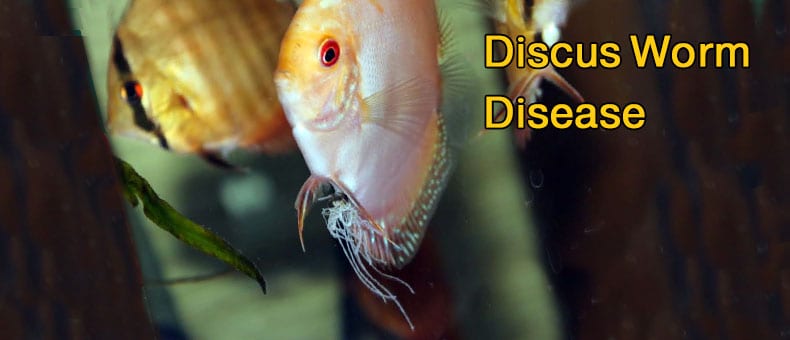
Treating Discus worms (Discus de-worming) like tapeworms or cestodes, flukes or trematodes can be done using wormer plus, metronidazole, praziquantel, API General Cure, and salt dips (Epsom salt).
Table of Contents
- Discus Worms
- How Many Types Of Discus Worms?
- Discus Worms Symptoms
- Discus Worms Disease Description And Causes
- 6 Methods To Treat Discus Worms
- Discus Worms Future Prevention Tips
- Related Questions
- Conclusion
Discus Worms
Discus worms or helminths are parasites that latch onto Discus and stay in any of its internal organs such as gills, and they reproduce and feed on it eventually causing diseases and then finally death. Examples are tapeworms or cestodes, flukes or trematodes.
How Many Types Of Discus Worms?
There are four major types of Discus worms. They include:
- Tapeworms or cestodes.
- Flukes or trematodes.
- Roundworms or Nematodes.
- Anchor worms.
Discus Worms Symptoms
Discus affected with parasites like tapeworms or roundworms exhibit the following symptoms:
- Loss of appetite.
- Stringy faeces that are white in colour.
- Discus begins to get skinny (emaciation).
- Discus skin begins to turn black.
- Death.
Discus Worms Disease Description And Causes
Parasites can always be found on Discus, they practically depend on the nutritious components of the fish to survive, and although parasites are dangerous, Discus can survive and be healthy irrespective of their presence. However, when Discus is exposed to stress in any form, these parasites tend to take advantage of the weak immune system and feed on Discus, causing more damage and injury to the fish.
How Long Is The Life Cycle Of Discus Worms?
The life cycle of parasites like worms is anytime between 2 hours and 3 days.
Are Discus Worms Contagious?
It is very easy to transmit worms from one fish to another in the tank, be that as it may, infestation by parasites like cannot be considered as being totally contagious because although one or more fishes in a tank can be affected by parasites, there could be others who aren’t and are very healthy.
How Do Discus Fish Get Infected With Worms?
Some of the most common worms that are capable of infesting your Discus are tapeworms, also known as cestodes, trematode worms or flukes, and nematode worms which are also called roundworms. Each of these worms can be introduced into the tank through a myriad of ways such as plants, objects and even fish.
When a plant you want to put into your aquarium or tank is already infested by worms, adding that plant into the tank makes your Discus and other breeds in your tank vulnerable to an attack and the same go for objects and fishes too.
Anchor worms are another kind of worms that you should watch out for, and although they are very rare, they can also cause damage to your Discus. One thing you might notice is that your Discus has long, dark brown extensions that look like threads dangling from its body.
List of all possible causes
Discus is infested by worms because of the following:
- New plants carrying worms are introduced into the aquarium or tank.
- New objects introduced into the tank are already infested by worms.
- New fishes that have already been infested by worms are introduced into the tank.
- The poor condition of water in the tank.
- Fighting and nipping among fishes in the tank.
- Improper diet.
- Disease infection weakens the immune system.
- Irregular or fluctuating temperature of the water in the tank.
- Disease infection.
6 Methods To Treat Discus Worms
When you notice any of the Discus worm symptoms, you should take the necessary steps to alleviate the problem and administer the Discus white poop treatment.
[METHOD1] – Using Wormer Plus
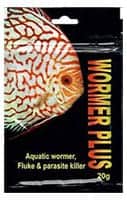
Wormer plus is very effective for eliminating any internal parasites (helminths) that infest your Discus and the dosage needed is dependent on the degree of infestation.
When you notice your Discus appears black, looks skinny or Discus has a thick white poop, you need to give them wormer plus as frequently as possible.
You don’t have to wait for your Discus to demonstrate any of the Discus worm symptoms before you use wormer plus on them, it is recommended to administer the medication at least once every month to make sure you keep your Discus in perfect health condition.
[STEP1] – Remove The Filter Carbon
It is highly recommended that you should get rid of any carbon in the tank so that the treatment will be very effective.
[STEP2] – Prepare The Proper Warmer Dosage
Each pack of wormer plus contains a 30 UK gallon measuring scoop so that you can administer treatment to your Discus without any difficulty and you will find instructions on the proper dosage to use.
[STEP3] – Prepare The Warmer In A Container
Mix wormer plus in a container (the container should be food grade) filled halfway with tank water and tighten the lid of the container after which you shake the container thoroughly to mix the medication.
[STEP4] – Apply The Warmer To The Tank
After you have done that, add the medication to the tank for about a minute – there’s no need to worry about the pH level of the tank water after you have put in the medication, wormer plus does not increase the water pH level.
The major and active component of wormer plus is Flubendazole which starves the worms slowly and therefore it is good for frequent usage.
[STEP5] – Blend Calcium Carbonate
It is also recommended to blend in calcium carbonate which gently restores and boosts the performance of Discus after the worms are rid of.
[METHOD2] – Using Metronidazole (Flagyl)
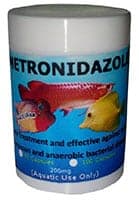
This is another effective medication for Discus that is under attack from internal worms. This is effective, especially if the worms are cestodes (tapeworms) or trematodes (flukes).
You better check my other deep detailed article on how to use properly Metronidazole and eSha Hexamita to cure internal parasites @ Discus Hexamita Disease – Metronidazole Complete Cure Guide.
[METHOD3] – Using Praziquantel
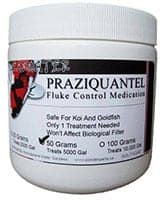
Praziquantel is especially effective when dealing with nematodes or roundworms.
[METHOD4] – Using API General Cure
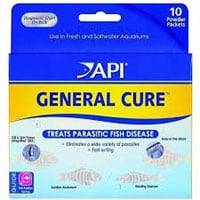
This is good medicine that has a blend of both Metronidazole and Praziquantel so instead of purchasing Metronidazole and Praziquantel independently; you could just go for API General Cure and check its affordable price from Amazon.
[METHOD5] – Using Use Epsom Salt
Dip Discus in water after adding Epsom salt to the water.
[METHOD6] – Using Potassium Permanganate
Put potassium permanganate in water and dip Discus in it.
Discus Worms Future Prevention Tips
- Clean your tank and change 25-30% of the water weekly.
- Avoid feeding your fish live foods, and even if you must, be sure that they are free of worms, especially nematodes.
- Avoid feeding your fish frozen worms.
- Avoid overcrowding your tank. If there are parasites already living in the internal organs of Discus, they might not cause any harm until Discus is stressed and an overcrowded tank can bring about fighting and nipping which could make Discus uncomfortable.
- Feed your Discus with the proper diet. Too much food does not mean good food, consult a vet or do your own personal research to find out the proper food to feed your Discus and in what quantity.
- Be sure that the water in the tank is in good condition. Check the ammonia, nitrite and pH levels regularly.
- Avoid any fluctuations in the tank water temperature.
- Avoid any cause of stress to your Discus.
Related Questions
How Do You Tell If Your Discus Fish Have Worms?
If your Discus has worms, they begin to exhibit certain signs (Discus worms symptoms) that you need to look out for such as:
- Discus refuses to feed (loss of appetite).
- White stringy faeces (Discus thick white poop).
- Although they are eating, Discus is getting skinny.
- The skin of Discus begins to get darker and then turns black.
How Do You Treat Discus With Internal Parasites?
You can treat internal parasite with:
- Metronidazole.
- Wormer plus.
- Praziquantel.
- Epsom salts.
- API General Cure.
How Do You Treat Fish Worms? How Do You Deworm Discus?
You can deworm your Discus by using antiparasitic worming medication such as API General Cure, wormer plus, metronidazole, and praziquantel. Just make sure to follow the instructions that come with the medication and if you can’t administer treatment confidently, consider consulting your vet.
Conclusion
Discus worms are worms that infest on Discus and feed on its nutrients because fishes are nutrient-rich. These worms include tapeworms, roundworms and flukes, which reproduce constantly feed on the internal organs of Discus.
Discus can be treated with worming medications such as wormer plus, Metronidazole, Praziquantel, API General Cure, etc. To prevent Discus from worm infestation clean your tank, avoid overcrowded tank, avoid temperature fluctuations in the tank water, feed your Discus with a proper food diet.


Very detail expansion of signs of discus worm and treatments.
Yes, infatuation this concern Terrific article
Hi,
what is the dosage for Epsom salt dip